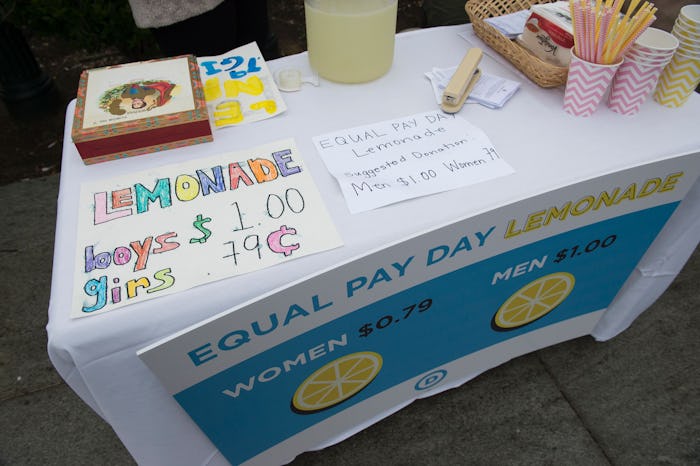Sometimes it's hard to believe we live in 2016. The technology has changed, but so much of who we are is the same. We still haven't figured out a universally flattering cut of jean, no one has cured cancer, and worst of all, women — specifically black women — are still earning way less than white men. Today is Black Women's Equal Pay Day, and it's definitely a day that you need to know about.
So why is August 23 Black Women's Equal Pay Day when National Equal Pay Day falls in April? Because it signifies how much longer it takes a black women to earn the same rate of pay as a white man. According to the math, a black woman must work 20 months to make the same amount a white man would make in just 12 months.
Black women are paid a paltry 60 percent of what white men are paid, according to the Center for American Progress. And when you consider that women in general make around 79 percent of what their male counterparts make, that number is even more disturbing. Particularly considering the fact that more than half of all American black women between the ages of 18 and 24 are enrolled in college, making them the most educated group in the country. So how exactly does it happen that the most educated group of people in American make only 60 percent of what they should be earning?
This pay disparity will cost a black women starting out in her career now approximately $877,840 over the course of a 40-year career, according to a recent report by the National Women's Law Center. The report noted:
If we don’t act to close the wage gap, a woman just starting out today stands to lose hundreds of thousands of dollars over the course of her career, undercutting her ability to provide for herself and her family, as well as her retirement security.
Millennials now make up the bulk of the American workforce, and this wage disparity needs to be top of mind for them because it applies across the spectrum. As the report by the NWLC points out:
African American women working as physicians and surgeons—a traditionally male, high-wage occupation—make 52 cents for every dollar paid to white, non-Hispanic men.
African American women working as customer service representatives—a mid-wage, female-dominated occupation—make 79 cents for every dollar paid to white, non-Hispanic men.
African American women working as construction laborers—a traditionally male, mid-wage occupation—make 85 cents for every dollar paid to white, non-Hispanic men.
African American women working as personal care aides—a heavily female, low-wage occupation—make 85 cents for every dollar paid to white, non-Hispanic men.
This simply cannot be the legacy we leave for these women. These women who are working hard but always expected to work harder (66 hours to every 40 hours worked by a white male). These women who are getting educations only to find out that they still might not be able to provide for their families or retire with security. These women whose mothers and grandmothers fought for their future.
This can't actually be a story we are telling in 2016.
